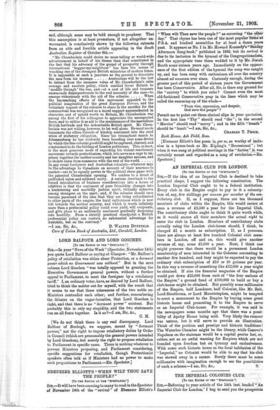EBENEZER ELLIOTT'S "WHEN WILT THOU SAVE THE PEOPLE ?"
[TO THR EDITOR OP THE "SPECTATOR.") will have been amusing to many to read in the Spectator of November 14th of the " revival " of Ebenezer Elliott's "When wilt Thou save the people F" as occurring "the other day." That rhyme has been one of the most popular iterns at P.S.A. and kindred assemblies for at least a dozen years past. It appears as No. 1 in Mr. Howard Kennedy's" Sunday Afternoon Song-book," published in 1892, but its revival is due to its inclusion in the hymnal of the Congregationalists, and the appropriate tune there wedded to it by Mr. Josiah Booth some sixteen years ago. Immediately on the appear- ance of the first edition of the hymnal the song was caught up, and has been sung with enthusiasm all over the country almost ad nauseam ever since. Curiously enough, during the greater part of this period of sixteen years the Government has been Conservative. After all, Sir, is there any ground for the " anxiety " to which you refer? Cannot even the most old-fashioned Conservative pray in the lines which may be called the summing-up of the whole— "Prom vice, oppression, and despair,
God save the people" ?
Permit me to point out three clerical slips in your quotation. In the first line " Thy " should read " the "; in the second "Mercies" should read " mercy "; and in the fifth" breath" should be " heart."—I am, Sir, &c., CHARLES T. PRICE.
Rock House, Ash Field, Ross.
[Ebenezer Elliott's fine poem is, per se, as worthy of hick, sion in a hymn-book as Mr. Kipling's "Recessional " ; but when it was sung at political meetings in the "forties" it was certainly meant and regarded as a song of revolution.---:ED. Spectator.]


























































 Previous page
Previous page